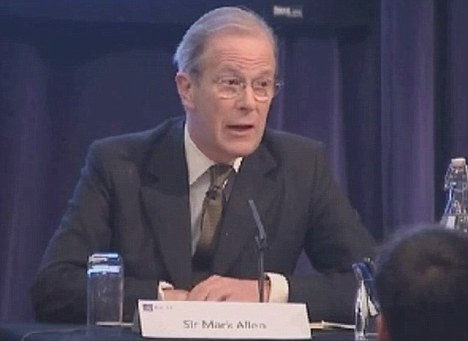By Glen Owen
Last updated at 3:48 AM on 06th September 2009
He is the modern Lawrence of Arabia who used his relationship with Colonel Gaddafi to help to secure a £200,000-a-year job with BP.
The career of ex-MI6 agent Sir Mark Allen, the driving force behind the suspected ‘deal’ to return Abdelbaset Al Megrahi to Libya, reads like an espionage novel, taking in Middle East spy schools, falconry and secret meetings in Pall Mall gentlemen’s clubs.
Our investigation has discovered how Sir Mark, 59 – who resigned from MI6 to join BP in 2004 – used the contacts made during a life in the shadows to build a new career in business.
 Sir Mark Allan, a modern Lawrence of Arabia, was the driving force behind the suspected ‘deal’ to return Abedlbaset Al Megrahi to Libya
Sir Mark Allan, a modern Lawrence of Arabia, was the driving force behind the suspected ‘deal’ to return Abedlbaset Al Megrahi to Libya
It reveals that he:
- Led the diplomatic drive to lift sanctions against Libya, teaming up with a top CIA agent for private meetings with Colonel Gaddafi.
- Chaired a secret meeting with Gaddafi’s spy chief in The Travellers Club in London, which included discussion of the Megrahi case and led to the Libyan leader being allowed to trade again with the West.
- Resigned from MI6 six months later to join BP and was cleared by the Cabinet Office to start working for the oil giant immediately.
- Is a friend of Justice Secretary Jack Straw, who backed his unsuccessful attempt to head MI6.
The Mail on Sunday tracked Sir Mark to his secure £1million apartment in Westminster but he refused to talk about the role he may have had in securing Megrahi’s return.
Last week it was revealed that he lobbied Mr Straw to speed up an agreement over prisoner transfers – which had been expected to lead to Megrahi’s return – to avoid jeopardising a trade deal with Libya worth up to £15billion to BP.
Allen’s book, Falconery In Arabia which was published in 1980
Yesterday Mr Straw admitted the agreement had played a ‘very big part’ in his decision to include Megrahi in the transfer deal.
In 2003, Sir Mark, then head of MI6’s counter-terrorism unit, joined forces with Steve Kappes, now deputy director of the CIA, to lead secret talks with Gaddafi’s regime to end international sanctions.
The two men embarked on shuttle diplomacy, flying around the world to meet senior Libyan figures, including Gaddafi.
Pulitzer prize-winning US author Ron Suskind, who has investigated British and American dealings with Gaddafi, said Sir Mark had several meetings with the Libyan leader in summer 2003.
‘He played a key role in charming Gaddafi out of his international isolation,’ he said. ‘His job was to make it clear to Gaddafi that anything could be put on the negotiating table, including Megrahi.’ At that point, Megrahi had been in a Scottish jail for two years.
A deal to end sanctions was sealed in December 2003 at The Travellers Club, where Sir Mark thrashed out an agreement with Gaddafi’s external intelligence chief Musa Kousa.
In return for the lifting of sanctions – and, sources say, assurances from Britain about Megrahi’s future – Gaddafi promised to abandon plans for weapons of mass destruction. Britain and America resumed relations the next month.
In May 2004, Sir Mark was the favourite of Mr Straw, then Foreign Secretary, to succeed Sir Richard Dearlove as Head of MI6. But the following month, after it was announced that the job had gone to John Scarlett, Sir Mark resigned to take up a special adviser’s job with BP.
Unlike Sir Jeremy Greenstock, Britain’s special representative to Iraq who joined BP at the same time, Sir Mark was told by the Cabinet Office’s Advisory Committee on Business Appointments that he could start work immediately.
Sir Mark, who was knighted in 2005, immediately used his Libyan contacts in BP’s drive to win gas and oil contracts in the country, flying with the then BP boss Lord Browne to meet Gaddafi in the desert.
The BP deal with Libya was announced in May 2007. But by November it had still not been ratified because of delays in finalising prisoner transfers which had been arranged between Tony Blair and Gaddafi in tandem with the BP deal. The sticking point was debate in the British Government over whether to exclude Megrahi.
Sir Mark made two calls to Mr Straw, asking for the agreement to be speeded up. Within six weeks of his second call in November 2007, Mr Straw had written to Scottish Justice Minister Kenny MacAskill to say Megrahi would be included.
In the Seventies, Sir Mark studied at the Middle East Centre for Arabic Studies, a British ‘spy school’ in a village near Beirut.
He was posted to Cairo in 1978, where he developed a love of falcon-hunting with Bedouins.
In 1980 he published Falconry In Arabia, with a foreword and photos by Wilfred
Thesiger, the late writer-explorer who devoted his life to roaming deserts in the spirit of Lawrence of Arabia.
A BP spokeswoman refused to comment yesterday.

